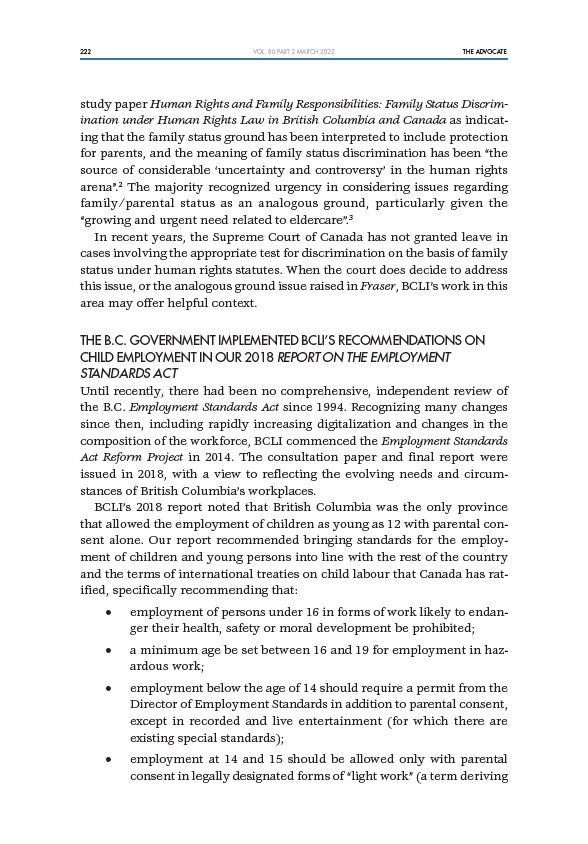
222 THE ADVOCATE
VOL. 80 PART 2 MARCH 2022
study paper Human Rights and Family Responsibilities: Family Status Discrimination
under Human Rights Law in British Columbia and Canada as indicating
that the family status ground has been interpreted to include protection
for parents, and the meaning of family status discrimination has been “the
source of considerable ‘uncertainty and controversy’ in the human rights
arena”.2 The majority recognized urgency in considering issues regarding
family/parental status as an analogous ground, particularly given the
“growing and urgent need related to eldercare”.3
In recent years, the Supreme Court of Canada has not granted leave in
cases involving the appropriate test for discrimination on the basis of family
status under human rights statutes. When the court does decide to address
this issue, or the analogous ground issue raised in Fraser, BCLI’s work in this
area may offer helpful context.
THE B.C. GOVERNMENT IMPLEMENTED BCLI’S RECOMMENDATIONS ON
CHILD EMPLOYMENT IN OUR 2018 REPORT ON THE EMPLOYMENT
STANDARDS ACT
Until recently, there had been no comprehensive, independent review of
the B.C. Employment Standards Act since 1994. Recognizing many changes
since then, including rapidly increasing digitalization and changes in the
composition of the workforce, BCLI commenced the Employment Standards
Act Reform Project in 2014. The consultation paper and final report were
issued in 2018, with a view to reflecting the evolving needs and circumstances
of British Columbia’s workplaces.
BCLI’s 2018 report noted that British Columbia was the only province
that allowed the employment of children as young as 12 with parental consent
alone. Our report recommended bringing standards for the employment
of children and young persons into line with the rest of the country
and the terms of international treaties on child labour that Canada has ratified,
specifically recommending that:
• employment of persons under 16 in forms of work likely to endanger
their health, safety or moral development be prohibited;
• a minimum age be set between 16 and 19 for employment in hazardous
work;
• employment below the age of 14 should require a permit from the
Director of Employment Standards in addition to parental consent,
except in recorded and live entertainment (for which there are
existing special standards);
• employment at 14 and 15 should be allowed only with parental
consent in legally designated forms of “light work” (a term deriving